Swiss ICRC hostage is free
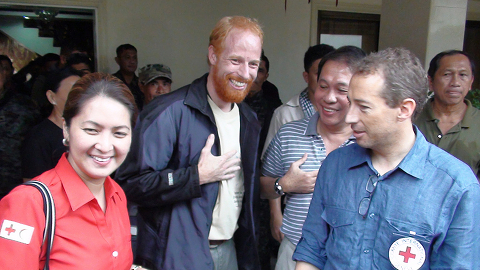
Islamic rebels in the Philippines have freed Swiss aid worker Andreas Notter but continue to hold another European captive, security officials said on Saturday.
The circumstances surrounding the release of Notter, an employee of the International Committee of the Red Cross (ICRC) were unclear, and he himself said he was not sure how it came about.
“I walked out and am happy to be alive and safe,” Notter told a media conference at the house of the provincial governor on the southern island of Jolo, where he was brought early on Saturday.
The 38-year-old from canton Aargau spent 93 days in captivity.
“I am very glad to be here with you. It happened very quickly. I am still a bit confused how it happened. My concern for now is my companion, Mr Eugenio Vagni. You are all aware that he is injured.”
In a statement, Switzerland’s foreign ministry said it was “relieved and pleased” with Notter’s freedom. It has demanded Vagni be “immediately and unconditionally released”.
Bern remains in close contact with the ICRC and Philippines authorities, spokesman Andreas Stauffer said.
Notter, Italian national Vagni and Philippines national Mary Jean Lacaba, all with the Geneva-based ICRC, were abducted by Abu Sayyaf rebels on January 15 when they were on a field visit to a prison on Jolo, a guerrilla stronghold.
Lacaba was freed by the rebels earlier this month and newspapers have said ransom was paid. The ICRC denies the claim and says it did not pay to free Notter.
“We never received any ransom demand for his release and we therefore have not paid,” said Florian Westphal, a spokesman for the ICRC. Notter’s return to Switzerland was “not foreseen in the coming hours,” Westphal added.
Attempted escape
Philippines Interior Secretary Ronaldo Puno said a group of men holding Notter was attempting to slip out of the security cordon around the guerrilla camp in the interior of Jolo when they were spotted by security forces who gave pursuit.
“The kidnappers left behind Mr Notter because they were not able to drag him with them anymore,” Puno told reporters, adding military pressure forced the rebels to free the hostage.
“We are fortunate that this incident ended without injury to Mr Notter.”
Earlier, a military spokesman had said Notter was found by troops. Richard Gordon, a Philippines senator and head of that country’s Red Cross, said that Notter was found walking near Indanan town, in the interior of Jolo, early on Saturday morning.
“He is relieved and he is glad to be alive,” Gordon said. “I told him the whole country prayed for him. He expressed concern for Eugenio. He said ‘Thank you for all your efforts.”‘
Notter, unshaven and with long hair, was smiling when he faced journalists after doctors gave him a clean bill of health, although he looked to have lost weight during his captivity.
The former history professor was given time to rest after a glass of milk and a soft meal, Puno said, adding Notter had already contacted family, friends and Red Cross colleagues.
“He is suffering from fatigue and may be a little bit disoriented for the moment,” Puno said.
“In good health”
“When we first heard reports of his extrication from the kidnappers, we were afraid because he was seen walking around with a cane. But he looks in good health. The doctors did not find any serious health problem.”
The Abu Sayyaf, a small but violent militant group based on Jolo and nearby Basilan, had earlier demanded that troops relax the tight cordon they were keeping around the rebel hideout before talks for the hostages’ release could start.
Provincial governor Tan sent a team of Muslim clerics to the rebel camp earlier this week to seek the release of Vagni, a 62-year-old who is reportedly suffering from hernia.
General Alexander Yano, the Philippines military chief said in a statement that disclosing the details of Notter’s rescue “may derail current efforts to ensure the safe release of the remaining victim”.
There was no word on any progress.
The Abu Sayyaf, with links to the Southeast Asian regional militant network Jemaah Islamiah and to al Qaeda, has been blamed for the worst militant attack in the Philippines, the bombing of a ferry in Manila Bay in 2004 that killed 100 people.
It is also notorious for high-profile kidnappings and large ransoms and has a history of beheading captives.
swissinfo with agencies
The group of about 400 fighters has sought to create an independent Islamic state in the southern Philippines since it was formed in the early 1990s. By 1991 the militants were launching major attacks, mostly with light arms and explosives.
The United States considers the group a terrorist organisation and has helped Manila with equipment, training and financial support in its fight against the separatists. The group’s name means “bearer of the sword”.
The militants have been involved in a number of bombings and kidnappings. In May 2001 they abducted 20 people from a resort on Palawan island west of Manila. The group beheaded one of the captives, an American. Troops staged a rescue that resulted in an intense gun battle that left two hostages dead. Another, an American missionary, was freed.
On February 27, 2004, a bomb hidden inside a television set exploded on a Superferry killing 116 people aboard. It was the worst terrorist attack in the Philippines.
Other Muslim groups have criticised Abu Sayyaf, whose members are more bandits than holy warriors, some say.
An Egyptian sheik said such violent acts have nothing to do with Islam as a religion. The Libyans have said the group violates Islamic law by holding innocent people captive. The world’s largest Islamic group, the Organisation of the Islamic Conference, has condemned the group’s actions and in the past has offered to help secure the release of hostages.
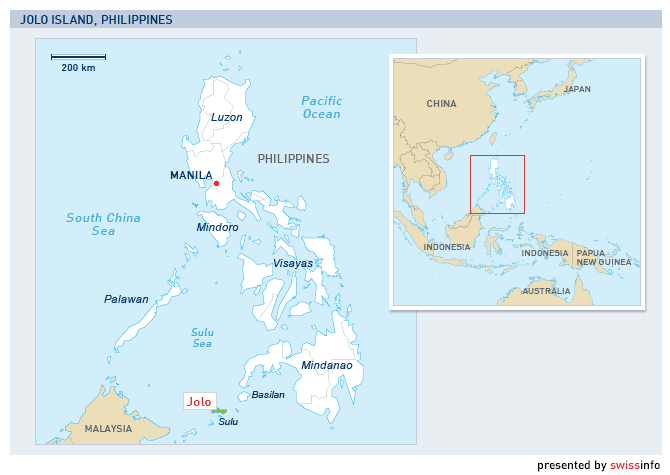

In compliance with the JTI standards
More: SWI swissinfo.ch certified by the Journalism Trust Initiative
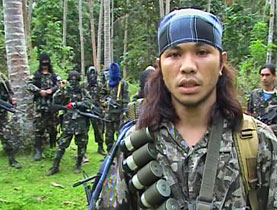
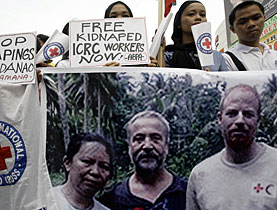
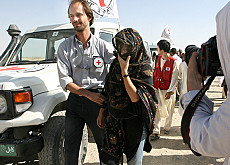
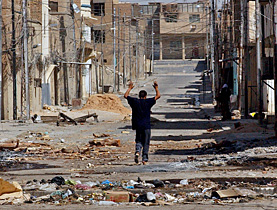
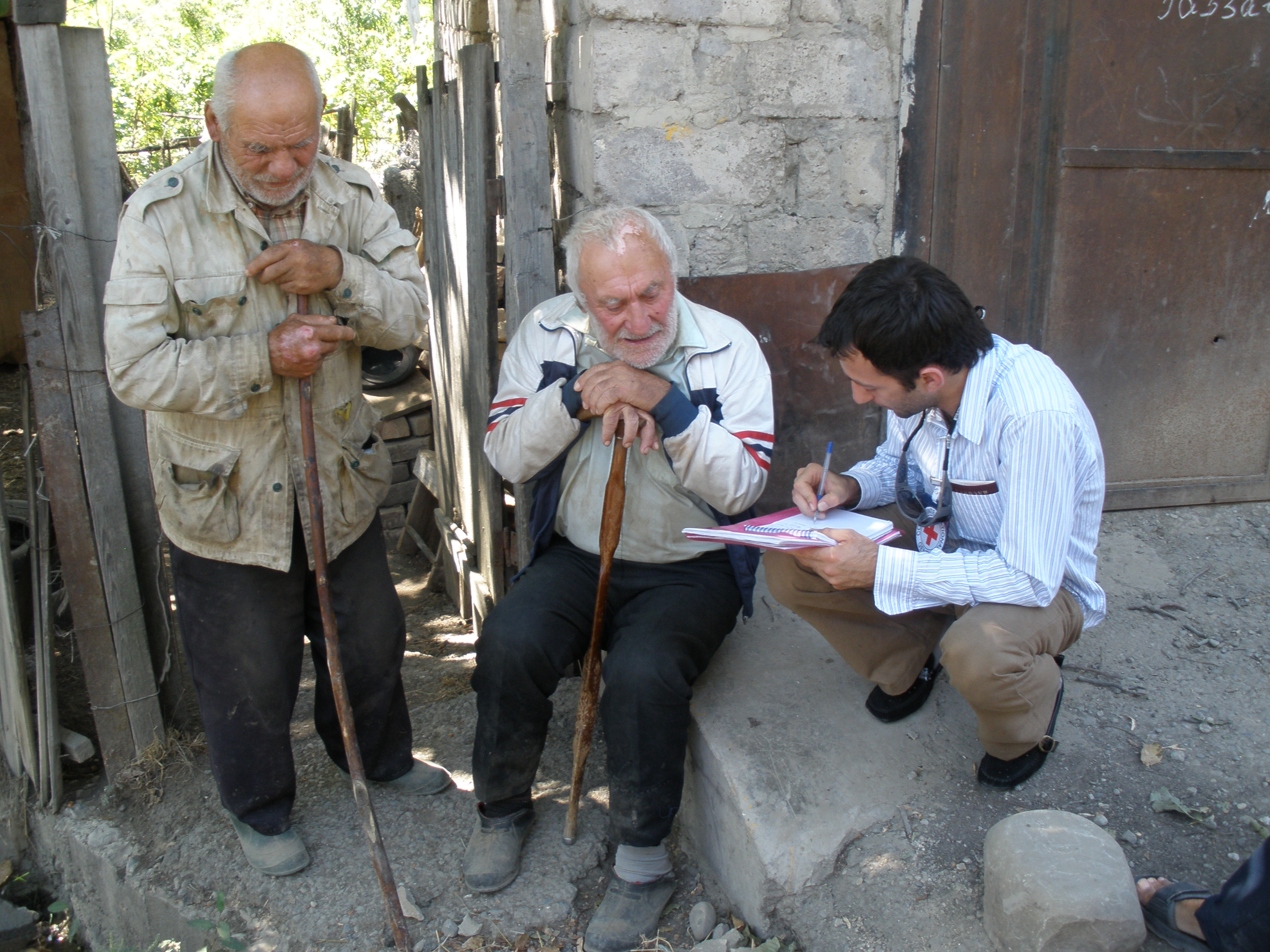
You can find an overview of ongoing debates with our journalists here. Please join us!
If you want to start a conversation about a topic raised in this article or want to report factual errors, email us at english@swissinfo.ch.